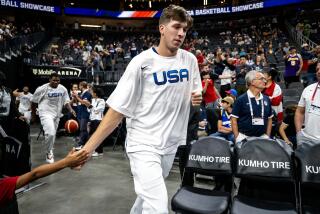Alice Springs a L-o-n-g Way From Home
- Share via
ALICE SPRINGS, Australia — The Lakers slap high-fives all around after winning by 38 points, their best margin of the season.
But instead of James Worthy, Byron Scott and Sam Perkins, these Lakers are guys named Dan Rusk, John Garnett and Eric Stoker.
It’s a long way to the Los Angeles Forum, or anywhere else in the United States. A link to home is important to the 3,000 or so American servicemen and dependents in isolated Alice Springs, particularly in the holiday season.
Most of the soldiers are stationed at nearby Pine Gap, a top-secret U.S. communications base said to have provided critical data to allied forces in the Persian Gulf War.
Don’t bother asking how work is going. As the townsfolk have learned and accept, the Americans will just smile and change the subject. The rest of the time, they’re happy to shoot the breeze or a basketball.
In fact, most seem pretty happy overall, despite living in the desert Outback about 750 miles from the nearest cities--Adelaide to the south and Darwin to the north.
“It’s just like living in a small town in America,” said Garnett, who is from Pineville, Ky., and has spent nearly eight years in Alice Springs. “It’s just a long way to the big city.”
A K mart department store, well-stocked supermarket and weekly supply flight provide some trappings of home.
There’s no McDonald’s, but Burger King--known here as Hungry Jack--offers Whoppers and fries. The new Pizza Hut set a national record for the fast-food chain in its opening week in September.
Stoker, of Anderson, Ind., said one of the restaurants served an American Thanksgiving dinner, with turkey and cranberry sauce.
The Yanks are unanimous about what they miss most: cable television, particularly the ESPN sports network.
“I miss flicking the remote control,” said Rusk, a 6-foot-11 center who played Division II college basketball at Nebraska-Omaha.
Otherwise, he feels right at home in Alice Springs, population 24,000.
“It’s kind of nice being back in a small town,” said Rusk, who is from Spencer, Iowa. “With all the confusion and traffic of a big city, sometimes it’s good to give up all the amenities.”
Tony Quinn, who grew up in Seattle, agreed: “With all that’s going on back home, with all the turmoil, it’s good to sit on the sidelines for a while.”
City officials have nothing but praise for the Americans and their efforts to join and help the community. It works both ways: The Americans feel they belong.
“I live on a street with a lot of Americans, but there’s no American ghetto,” Rusk said. “There are no feelings of ‘ugly Americans’ here. It’s like no big deal.”
Sports provide common ground with the locals. The desert heat rules out hockey, but there is basketball for men and women, a baseball program involving more than 300 children and adults, volleyball; bowling, even a little football, which the Australians call gridiron.
The Americans are absorbing local culture, and forming an indoor cricket team.
In all sports, players double as timekeepers, referees and coaches. The only rewards are exercise, competition, camaraderie and passing on a little Yankee ingenuity.
“It’s really fun teaching a kid who’s hit nothing but a cricket ball all his life to hit a baseball,” Stoker said.
Coaching “gives me a chance to work with young kids,” said Quinn, who is black and has taken several aboriginal youths under his wing.
The basketball team he put together has won the last two championships and, like the Chicago Bulls back home, is going for a “three-peat.”
“If we do that, I’m going to retire from playing,” Quinn said with a grin.
More to Read
All things Lakers, all the time.
Get all the Lakers news you need in Dan Woike's weekly newsletter.
You may occasionally receive promotional content from the Los Angeles Times.






